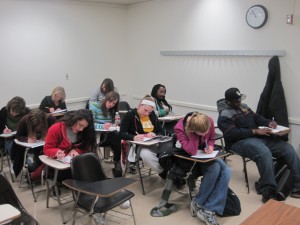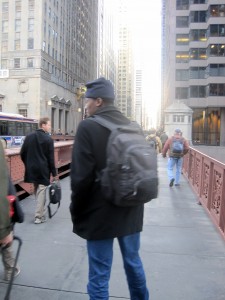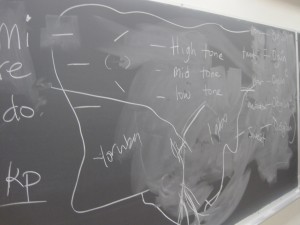 “There are three major reasons why I wear this cap wherever I go, around the University, and when I come to class as I will from now on. I’m about to tell you.”
“There are three major reasons why I wear this cap wherever I go, around the University, and when I come to class as I will from now on. I’m about to tell you.”
That was one of the first things I said to them them, a few seconds after I walked in to the full class where a horde of quiet, curious looking faces of attentive students stared back at me, none of who knew what exactly the class was going to be like. It was just like old times. They gave me rapt attention, they smiled when they had to, they had random looks of wonder and intrigue. But they probably had never seen anyone wearing this kind of cap before. It’s African, made of the finest aso oke, from Nigeria, West Africa. The class was full. I had prepared only seventeen copies of the syllabus, hoping that there would be at least fifteen students in class, and I’d have a few to spare. There were nineteen of them. No kidding! The twentieth student signed up a few hours later. This is a long shot from my previous nine students of the Fall semester! I took in the sight of them, fidgeted for a few seconds, and found a way into an introductory talk that was meant to put them at ease while providing an insight in the content of the course, and what it would take to pass, and to enjoy.
 “The first reason why I wear this cap is that it is cultural. Yoruba people like to complement their dressing with a matching cap.”
“The first reason why I wear this cap is that it is cultural. Yoruba people like to complement their dressing with a matching cap.”
Before I told them where I’m from, I first asked them to take a guess, and none got it right. So, I wrote it out on the board, and I heard a gasp, and random giggles. “Yes,” I said, “By now, all of you are familiar with the name of this country since Christmas day, right?” They all agreed. “Well, what you probably didn’t know,” I continued, “Is that we have over 250 ethnic groups, and over 500 languages. You also didn’t know, perhaps, that Yoruba – the language you would be learning for the rest of this semester – is spoken by over/about thirty million people both in Africa and all around the world. We have also produced a Nobel laureate in literature.”
“The second reason – as you can guess – is that it’s winter, and I don’t want to kill myself by exposing my head to the harsh cold weather”
 They laughed at this one. It was the first victory. “It’s true,” I continued, “I’ve never lived in any place colder than 20 degrees Celcius before. It’s a wonder that I’m still alive now in a temperature of sometimes minus twenty.” That seemed to shock and surprise a few of them, and I continued. “Has anyone of you heard of a singer called Sade Adu? What about the musician called Seal? Oh, you have? Good. Does anyone know who Hakeem Olajuwon is? He played for the Chicago Bulls, I think. Oh yea, many of you do? Nice. What about Adewale Akinnuoye-Agbaje, that very dark-skinned man that played an Egyptian mercenary in The Mummy Returns and a French Legionnaire in the movie Legionnaire? He was also in the first seasons of Lost, I think.” I counted them and smiled. “Well, great,” I said “one thing they all have in common is that they are Yoruba, originally from Nigeria. Are you excited already? In this class, we shall learn everything we can about the Yoruba people, their culture, way of life, and language. And the first step in that knowledge is that we all must have Yoruba names. Yes, indeed. I’ve told you mine, and you’ve told me your American names. Now, you have to go and look for Yoruba names, their meanings, and why you want to bear them. Go online, ask friends, read books, but by Wednesday, we will all begin the necessary steps to become Yoruba citizens. Who’s excited already? Great!”
They laughed at this one. It was the first victory. “It’s true,” I continued, “I’ve never lived in any place colder than 20 degrees Celcius before. It’s a wonder that I’m still alive now in a temperature of sometimes minus twenty.” That seemed to shock and surprise a few of them, and I continued. “Has anyone of you heard of a singer called Sade Adu? What about the musician called Seal? Oh, you have? Good. Does anyone know who Hakeem Olajuwon is? He played for the Chicago Bulls, I think. Oh yea, many of you do? Nice. What about Adewale Akinnuoye-Agbaje, that very dark-skinned man that played an Egyptian mercenary in The Mummy Returns and a French Legionnaire in the movie Legionnaire? He was also in the first seasons of Lost, I think.” I counted them and smiled. “Well, great,” I said “one thing they all have in common is that they are Yoruba, originally from Nigeria. Are you excited already? In this class, we shall learn everything we can about the Yoruba people, their culture, way of life, and language. And the first step in that knowledge is that we all must have Yoruba names. Yes, indeed. I’ve told you mine, and you’ve told me your American names. Now, you have to go and look for Yoruba names, their meanings, and why you want to bear them. Go online, ask friends, read books, but by Wednesday, we will all begin the necessary steps to become Yoruba citizens. Who’s excited already? Great!”
“Well, the third reason is that I sometimes forget where I left my comb in the room when I wake up in the morning…”
And so it begins, just like old times!
15 Comments to Just Like Old Times so far. (RSS Feeds for comments in this post)